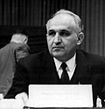Portal:Communism
IntroductionCommunism (from Latin communis, 'common, universal') is a left-wing to far-left sociopolitical, philosophical, and economic ideology within the socialist movement, whose goal is the creation of a communist society, a socioeconomic order centered around common ownership of the means of production, distribution, and exchange that allocates products to everyone in the society based on need. A communist society would entail the absence of private property and social classes, and ultimately money and the state (or nation state). Communists often seek a voluntary state of self-governance but disagree on the means to this end. This reflects a distinction between a more libertarian socialist approach of communization, revolutionary spontaneity, and workers' self-management, and a more authoritarian vanguardist or communist party-driven approach through the development of a socialist state, followed by the withering away of the state. As one of the main ideologies on the political spectrum, communism is placed on the left-wing alongside socialism, and communist parties and movements have been described as radical left or far-left. Variants of communism have been developed throughout history, including anarchist communism, Marxist schools of thought, and religious communism, among others. Communism encompasses a variety of schools of thought, which broadly include Marxism, Leninism, and libertarian communism, as well as the political ideologies grouped around those. All of these different ideologies generally share the analysis that the current order of society stems from capitalism, its economic system, and mode of production, that in this system there are two major social classes, that the relationship between these two classes is exploitative, and that this situation can only ultimately be resolved through a social revolution. The two classes are the proletariat, who make up the majority of the population within society and must sell their labor power to survive, and the bourgeoisie, a small minority that derives profit from employing the working class through private ownership of the means of production. According to this analysis, a communist revolution would put the working class in power, and in turn establish common ownership of property, the primary element in the transformation of society towards a communist mode of production. Communism in its modern form grew out of the socialist movement in 19th-century Europe that argued capitalism caused the misery of urban factory workers. In the 20th century, several ostensibly Communist governments espousing Marxism–Leninism and its variants came into power, first in the Soviet Union with the Russian Revolution of 1917, and then in portions of Eastern Europe, Asia, and a few other regions after World War II. As one of the many types of socialism, communism became the dominant political tendency, along with social democracy, within the international socialist movement by the early 1920s. (Full article...) Selected article
Problems of Peace and Socialism (Russian: Проблемы мира и социализма), often referred to by the name of its English-language edition World Marxist Review (WMR), was a joint theoretical and ideological magazine of communist and workers parties around the world. It existed for 32 years, until it closed down in June 1990. The offices of WMR were based in Prague, Czechoslovakia. Each edition of the magazine had a circulation of above half a million, being read in some 145 countries. At its height, WMR appeared in 41 languages, and editors from 69 communist parties around worked at its office in Prague. The master copy of the magazine was its Russian-language edition Problemy Mira i Sotsializma.
Selected biography
Todor Khristov Zhivkov (Bulgarian: То̀дор Хрѝстов Жѝвков, tr. Todor Christov Živkov; IPA: [ˈtɔdɔr ˈxristɔf ˈʒifkɔf]; 7 September 1911 – 5 August 1998), was the communist head of state of the People's Republic of Bulgaria (PRB) from 4 March 1954 until 10 November 1989.
He became First Secretary of the Bulgarian Communist Party in 1954 and remained on this position for 35 years, until 1989, thus becoming the longest-serving leader of any Eastern Bloc nation, and one of the longest ruling non-royal leaders in history. His rule marked a period of unprecedented political and economic stability for Bulgaria, marked both by complete submission of Bulgaria to Soviet rule and a desire for expanding ties with the West. His rule remained unchallenged until the deterioration of East-West relations in the 1980s, when a stagnating economic situation, a worsening international image and growing careerism and corruption in the BCP weakened his positions. He resigned on 10 November 1989, under pressure by senior BCP members due to his refusal to recognize problems and deal with public protests. Within a month of Zhivkov's ouster, Communist rule in Bulgaria had effectively ended, and within another month the People's Republic of Bulgaria had formally ceased to exist. Did you know...
Selected image Election mural of the Communist Party of Nepal (Unified Marxist-Leninist). In Nepal the swastika is used as a voting symbol in ballots.
Photo credit: Soman
Related portalsRelated WikiprojectsRelated featured content Participate!Everyone is welcome to participate in WikiProject Socialism, where editors collaborate to improve all aspects related to socialism on Wikipedia. Selected quote
SubcategoriesWant to find an article related to communism? Try browsing through any of the main categories below:
Select [►] to view subcategories
GeneralVariations of CommunismOrganizations and ruling parties, past and present
Personalities
Present and former Socialist states (under the direction of Communist parties)
Ideology and tactics
StructureMarxian economics topicsHistorical events
Military topics
Artists and writers
Influential works
Anti-communism
Things you can do
Communism in non-English WikipediasArticles:
Associated WikimediaThe following Wikimedia Foundation sister projects provide more on this subject:
Discover Wikipedia using portals |

























